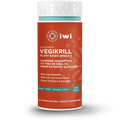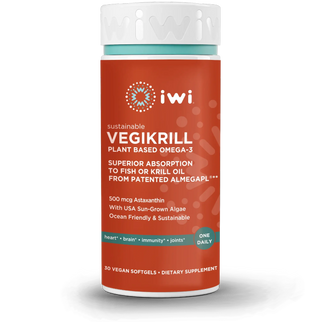Although not easy to pronounce at first glance, astaxanthin is a nutrient to pay attention to. Found in several marine animals and plants, astaxanthin is one of the most powerful nutrients of its type, and it may offer surprising health benefits when made to be part of a regular diet.
Altogether, astaxanthin is a key nutrient to include in your daily nutrition and may offer several benefits for your eyes when you do.
What Is Astaxanthin?

Astaxanthin is a carotenoid, which is also known as a colorful compound. As a carotenoid, astaxanthin provides a pinkish-red color in some plants and animals. Astaxanthin can be found naturally or made synthetically, but it is more effective at supporting healthy cells when it comes from nature.
Put more generally, astaxanthin is a type of antioxidant. Astaxanthin is in a similar family as zeaxanthin, beta carotene, and lutein, which are other carotenoids with antioxidant properties. However, astaxanthin is the strongest of the others, featuring antioxidant activity that is ten times higher compared to zeaxanthin and lutein.
With such unique potential, astaxanthin should be on anyone’s radar to support your overall wellness. Astaxanthin may offer a wide variety of benefits for your health, like supporting the health of your brain and skin. However, this carotenoid is most well-known for its potential influence on the eyes.
What Are the Benefits of Astaxanthin for Your Eyes?
Astaxanthin is an impressive compound, and it has quickly gained a reputation for its potential ability to support eye health. Consuming astaxanthin regularly can offer these impressive potential benefits for your eyes.
1. Support in Filtering Blue Light
In today’s world, blue light surrounds us almost constantly. People have begun discussing the dangers of blue light more frequently as we have continued to learn more about the effects of cell phones and TV screens that emit blue light and disrupt our sleep cycles.
Blue light is also found coming from the sun, and prolonged exposure can be detrimental to the eye. Specifically, blue light can be damaging to the photoreceptors in our eyes, especially when we spend a lot of time around it.
In one study, astaxanthin was shown to help support photoreceptors in the eyes when exposed to blue light for an extended period of time. By supporting the health of these photoreceptors, astaxanthin may support the eye in withstanding exposure to light from the sun.
2. Supports Healthy Blood Flow to the Eye
The powers of astaxanthin are wide-ranging when it comes to the eye. Some studies have shown that astaxanthin may support blood flow to the eye by supporting healthy muscle function and opening the capillaries that bring blood to the retina.
By working to maintain healthy blood flow, this carotenoid may help support overall eye function and development. There is still more research to be done regarding the effects of astaxanthin on the health of your eyes, but the results so far have shown some promising potential.
3. Supports Healthy Eye Cells
The biggest selling point behind astaxanthin is that it is an impressive antioxidant. Antioxidants are compounds that work to neutralize the effects of harmful molecules called free radicals. Free radicals build up in the body and begin to oxidize in your body.
Oxidation can begin to wear down your eyes over time, which can lead to cell damage in multiple parts of the eye, including the cone, cornea, retina, and lens. This oxidation is especially concerning when it is prolonged.
By supporting your cells during exposure to free radicals in the body, the antioxidants in astaxanthin help to support healthy cells. These healthy cells help keep the eye in good shape and functioning the way it should be.
4. Supports Healthy Aging of Your Eyes
The antioxidant effects of astaxanthin don’t stop at supporting your eyes in the present — they may have some long-term benefits as well. As you age, your eyes become more vulnerable to decline and conditions.
The high antioxidant content of astaxanthin can play an essential role in supporting your eye health, specifically as you age.
By maintaining healthy cells in your eyes, astaxanthin may support healthy aging in your eyes and keep them functioning well, even as you age. Over time, the health of your eye cells may start to decline. When you consume astaxanthin regularly, the antioxidant effects may help to support the health of your eye cells as you age, so taking it now is a great way to be proactive.
One study has shown that supplementing your diet with astaxanthin can help support the function of several areas of your vision, even as you age.
Where Can You Find Astaxanthin?
Astaxanthin is found mostly in marine animals, and some plants. The biggest indicator of astaxanthin content in a plant or animal is a pinkish-red pigment.
Some of the most common sources of astaxanthin are:
- Algae
- Krill oil
- Salmon
- Shrimp
Is Krill Oil a Good Source of Astaxanthin?
Of this list, krill oil is one of the most popular sources of astaxanthin. Many people consume astaxanthin as a byproduct of taking krill oil for omega-3 fatty acids. Krill oil is one of the few supplements that offers both docosahexaenoic acid (DHA) and eicosapentaenoic acid (EPA), the two most valuable omega-3 fatty acids that support the structure and function of the cells in our body.
Between these two essential fatty acids and the high antioxidant powers of krill oil, there are many reasons that people choose to take this supplement.
Some of the benefits of consuming the DHA and EPA omega-3 fatty acids in krill oil include:
- Supporting a healthy heart
- Helping to maintain healthy cholesterol and blood triglyceride levels already within a normal range
- Helping to support a healthy blood pressure
- Maintaining healthy joint function
- Supporting healthy cognitive function, including both memory and motor function
- Supporting emotional wellness
Despite the benefits of its omega-3 fatty acid content, consuming krill comes with a few drawbacks and can exclude a wide range of people from taking the supplement.
For one, krill oil comes with an unpleasant fishy taste and fishy burps that are unpleasant for anyone, let alone people who dislike seafood. People with seafood or shellfish allergies are often not able to safely consume krill oil. Then, of course, anyone on a vegan or plant-based diet is unable to consume krill oil.
At the same time, the production of krill oil is harmful to the ocean environment. Many large fish and marine animals rely on krill for their food. Harvesting krill out of the water to make supplements throws off the balance of ocean ecosystems and the food chains within them. Ultimately, consuming krill leads to declining fish populations and affects the biodiversity of the world’s beautiful oceans.
What Is an Alternative To Krill Oil?
Few supplements are able to match up to the benefits of krill oil by offering DHA, EPA, and antioxidants, but that doesn’t mean zero can. Algae is one of the few supplements that can live up to the reputation of krill oil.
Algae doesn’t just offer similar benefits to krill oil — it offers even more, both for your health and wellness and the environment. Algae supplements are entirely plant-based, making them great for people on a plant-based diet and those with seafood allergies.
Algae may even be a more practical option for people of any lifestyle. In fact, the omega-3s in algae are absorbed by the body at a rate that is 1.7x higher than those in krill oil. This higher absorption rate means that the body is better able to use the nutrients and put them to use.
To add to the benefits of algae-based omega-3s, algae is great for the environment too. Algae also uses sustainable production methods, so it is better for the environment. Plus, since algae supplements are entirely plant-based, they don’t have the same negative effects on the environment as krill oil. By switching to an algae-based iwi life Vegikrill supplement, you can receive astaxanthin and omega-3s without harming precious ocean creatures.
The Benefits of Krill Oil Without the Krill
Krill oil is one of the most popular sources of astaxanthin, but you can enjoy the many benefits of this nutrient without the drawbacks of consuming krill. To get all of the benefits of astaxanthin and omega-3 at the same time, try our iwi life Vegikrill supplement.
Vegikrill provides all the benefits of krill oil without the harmful effects on the environment or your breath, offering both valuable astaxanthin and essential omega-3 fatty acids. To see all the powers of algae, check out our full family of iwi life omega-3 supplements.
Sources:

















